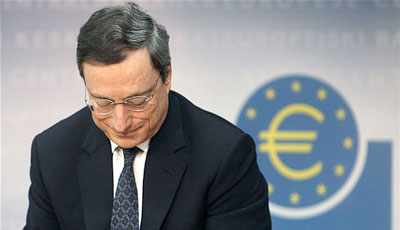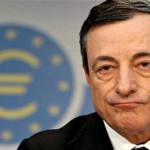ECB Executive Board’s QE Proposal Calls for Roughly €50 Billion in Bond Buys Per Month

The European Central Bank’s executive board proposed buying roughly €50 billion ($58 billion) a month in bonds for at least a year, according to people familiar with the matter, but markets largely shrugged as investors pondered whether the ECB will do enough to stoke Europe’s fragile economy.
The board’s proposal for the bond-purchase program, known as quantitative easing or QE, forms the basis of deliberations by the entire 25-member governing council on Thursday on whether to embark on a path already forged by the U.S. and the U.K. but mostly avoided in Europe. The final number and details of the program could change after the full board has its say.
The initial reaction to details of the ECB’s plan in the financial markets on Wednesday was jumpy, betraying nerves among investors who have racked up large bets on aggressive action by the central bank. The euro fluctuated before ending the trading session in Europe a little lower, showing that traders and investors see the proposals as a sign that large asset purchases are coming, and there was a modest price decline in government bonds in the U.S. and the eurozone. Stocks rallied after an initially volatile reaction, with Germany’s DAX index closing at around an all-time high.
Despite those gains, the markets showed a less-than-dramatic response, signaling that expectations for more easy-money policies from the ECB are already factored into stock, bond and currency prices.
Investors are counting on the ECB to unveil a program that will shock and awe the market, said Christopher Sullivan, who oversees $2.45 billion as chief investment officer at the United Nations Federal Credit Union in New York. But “from what we have seen today, it seems investors are anything but confident they should expect that outcome.”
“More details are needed from [Thursday’s] official announcement” and ECB President Mario Draghi ’s news conference, said James Kwok, head of currency management at Amundi Asset Management, which manages $1 trillion.
The lack of a stronger market response also reflects the success the ECB has had in recent months in convincing investors that they were prepared to act. In that sense, the bank has gotten many of the effects of QE—lower bond yields and a weaker exchange rate—before actually launching the program.
One key unknown detail is whether the bond purchases will be spread across central banks in the eurozone, which is the norm for monetary-policy operations, or if the ECB makes an exception and puts the risk for each country’s bonds on its national central bank, meaning Germany’s Bundesbank would hold German bonds and France’s central bank would assume the risk of French debt. That approach could assuage concerns in Germany that its taxpayers may be on the hook for other eurozone members’ debts.






























